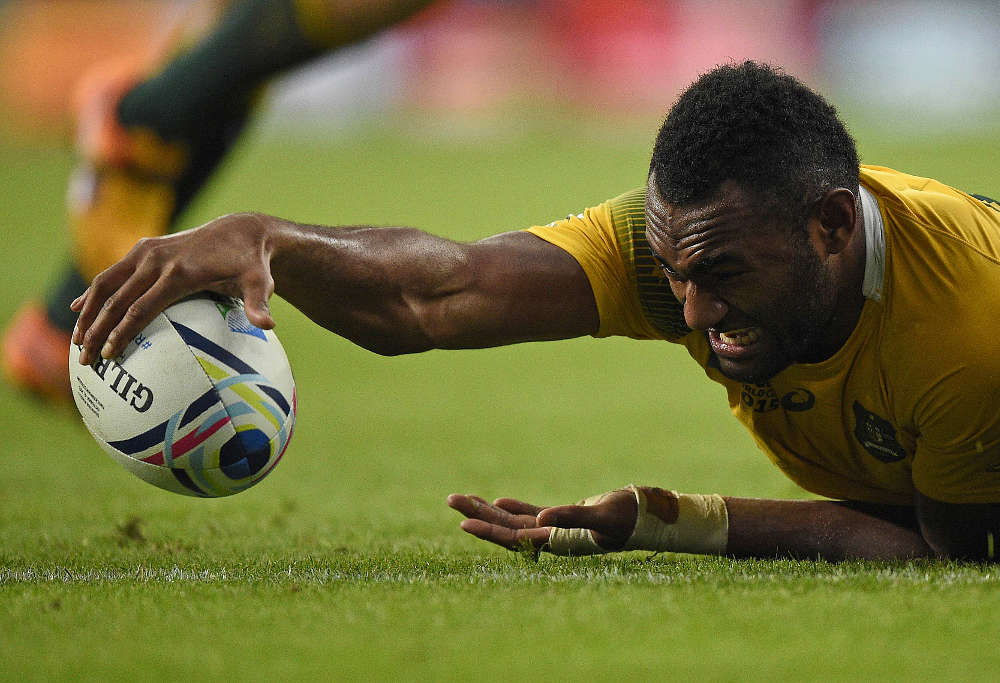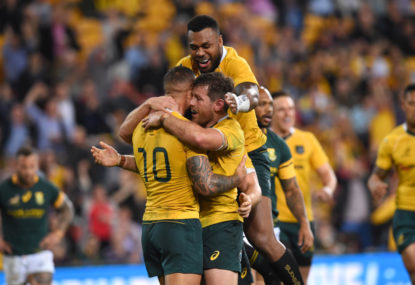Fine margins are often the difference between greatness and mediocrity, and the Wallabies emerged on the right side of that distinction on the weekend.
A few thousand fewer votes in mid-west states and Donald Trump might not be the United States President-elect. But here we are, looking nervously at one another as we contemplate the future.
Another hand-off to Legarrette Blount instead of a fade pass to Rob Gronkowski and Tom Brady’s New England Patriots might have another dramatic late-comeback victory. Instead, the Seattle Seahawks are regaled as a great team getting their act together as the season rolls on.
If it wasn’t for one particular pitch hanging over the middle of the plate, the Cleveland Indians may not have conceded that second run in the tenth inning and won the World Series themselves. But instead, the Cubs gave themselves a two-run buffer and held on to win their first championship in over a century.
If only the Australian batsmen had – okay, that wasn’t close. There are no fine margins to speak of when it comes to the Australian cricket team.
But the point still stands; there are often a number of close calls, and what-could-have-been moments that need to go your way when something great is achieved.
Even the 1984 Grand Slam Wallabies had an extremely close call against Ireland. Within the last 15 minutes, Mark Ella had to kick a drop goal to tie the game and then score a try from a David Campese assist to put Australia ahead.
It’s not hard to imagine things going differently when you fall behind Ireland at home deep in the second half. But no one cares now – they won.
The Wallabies would be fumbling through the second half of yet another Northern Hemisphere tour in a distracted haze if it wasn’t for the length of Tevita Kuridrani’s arm, after the 23-22 victory over Scotland on the weekend.
If Kuridrani couldn’t quite reach the chalk this week would be full of recriminations.

Will Skelton’s yellow card would be discussed all week. By Thursday someone would try to mount a defence for the stupidity on the field and by Saturday morning it’d be a NSW conspiracy to keep Waratahs players in the squad.
We’d be tearing the Wallabies apart for their inability to defend well enough to keep a fired up Scotland team, that is ultimately short of firepower compared to the Wallabies and many other outfits, at arms length.
Criticism would rain down because, once again, the Michael Cheika-coached Wallabies weren’t able to get themselves into the ruthless mindset Test rugby requires for the full 80 minutes.
We’d be looking for a win against France to hang out had on before heading to the tougher home unions just trying to avoid getting flogged.
But Kuridrani’s arm was just long enough to reach out and find the tryline.
So Cheika is probably going to rest players against France to give the broader squad some game time and keep the first team fresh for the continued assault on the Grand Slam.
If they do indeed knock over Ireland and then England, no one is going to look back on the Scotland game and quibble about it being just a one-point win. That is what being one the right side of fine margins gives you – a chance to achieve something great.
It’s important for Australian rugby that the dream of a Grand Slam wasn’t snuffed out at just the second, and lowest, hurdle.
Before the tour started, I gave the Wallabies very little chance of beating all four Home Unions.
After seeing how they’ve played in the first two matches, their chances have improved. It’s not likely, but it’s possible.
The presence of a real Tevita Kuridrani, who knows the outside centre position, has given the mostly-new backline some direction and confidence. Inside him, Reece Hodge is starting to look more like a modern inside centre and is locating those subtle angles that unlock defensive lines.
Dane Haylett-Petty and Israel Folau are both getting more involved, as their talents demand.
Further in, Foley has well and truly won the battle with Quade Cooper for the number 10 jersey. He has returned to his style of straightening the attack that sets him apart and the planned moves are starting to work on the field now too.
They aren’t quite doing it all at once yet – there is a pushed pass or an ill-timed offload for every line break – but there are a few good signs.
But that is all possible because the forward pack is making just a little more room. And on attack they are attempting to replicate the All Blacks’ method of forwards passing and offloads.
While it isn’t as deceptive and creative as the best in the world just yet, this creates just enough indecision and draws in one or two more defenders, so the space out wide increases marginally – enough for Foley and Folau to get to work.
In taking on the likes of Ireland and England, the Wallabies will miss Adam Coleman, who is coming home to recover from a knee injury that saw him leave the pitch after just five minutes on the weekend.
He has been a standout performer in a less brittle and more consistent forward pack in the second half of this Test season. His partnership with Rory Arnold gave the Wallabies bulk, daring and enough of their own lineout ball to be a vast improvement on what came before them.
I fear any less starch in the Wallabies forward pack will be their undoing over the second half of this tour.
Against Scotland the Wallabies didn’t defend particularly well whenever they were close to their own end, and even on attack were occasionally out-muscled by Scotland.
Against Ireland and England, those physical weaknesses are going to be more sternly tested. And I don’t mean in the ‘niggle and after the whistle rubbish’ way the Wallabies have engaged in this year.
Ireland have the forwards to bend the best defensive lines backwards, and coming off two matches against the All Blacks, they will be battle-hardened. And with a win, have an achievement Australia can’t match this year.
They will pound away and look to engage the Wallabies in general play mauls that have been so successful for them in this match up previously.
England’s counter-ruck will be ferocious the week after. As shown in the three Tests earlier this year, they’ll make it extremely hard to secure the ball, especially if it is resting at the back of the ruck for any amount of time.
They’ll also rush up in defence for periods and take the time and space away from Foley and Folau better than Wales, Scotland and France can.
The forwards will need to be physical to repel those attacks and show patience and skill to make ground up the middle that provides the space the backs have enjoyed thus far.
While the forwards are showing more skill, much of that has been on display well short of the advantage line and under favourable conditions. They’re going to have to show steel and determination to make those same tight runs and passes under more pressure in coming weeks.
The Wallabies backline has been pleasing to watch so far, but the forwards are going to have to improve if a Grand Slam is to become a real prospect.






























































































